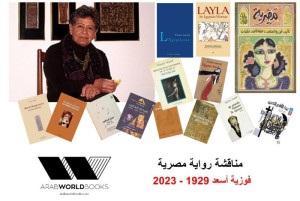Master Abdo, the Oymagy1, our neighbor, traveled to Iraq and left his son As’ad in the shop. As’ad was a tall fair boy with yellowish hair. In his father’s absence, he would come after the preparatory school day to the shop, open it, and feed the two green canaries hung in a cage above the door. After that, he would close the shop and we would not see him till the sun floated in the yellowness of the afternoon. He would come again, open the door, sweep the door step, sprinkle water in front of the shop, fetch the beech chair from inside, put it in front of the shop and sit in the breeze reading in his book. Till that point, there was no problem; neither did we expect anything to take As’ad out of this daily routine. One day, we heard amongst the people of our neighborhood, which is a very much exaggeration-loving neighborhood, that the boy As’ad, after he had opened the shop, swept the doorstep, sprinkled the water, brought his book and sat in his beech chair reading, two police informers, from the neighboring police station, came and grabbed the book off his hand. As the boy As’ad stood in front of them wondering what had happened, the informer Mokhtar, labeled as the bulldozer, punched him in the stomach. Before As’ad could recover from aching and arching, Mokhtar’s hand had fallen on his face turning him into one pile. The people of our neighborhood gathered around the two police secret informers, who stood silent for a while black smoke rose from their heads. The boy As’ad was between their feet aching. Later on, Hamadah the grocer, son of uncle Hamed the grocer said that the Bulldozer looked like a piece of wood, blackened all over by hubbub before its nails had been plucked out. The other inofrmer, seen for the first time by our neighborhood, was a young man in a pair of trousers and a shirt; his hair combed to one side like Abdulhaleem Hafez.2 Hamad said that he was a new police secretary in the station. The people of our neighborhood asked, carefully calculating the effect of their words, “ What is the matter Mokhtar?” Like the wood leveler called Rabbob3,Mokhtar raved. He bowed towards the boy As’ad, and clutched the collar of his shirt while As’ad face was like a white sheet of paper. “ What did As’ad do, officer Mokhtar?” Out of the sprinkle coming out of Mokhtar’s screaming mouth, the people of our neighborhood could figure out that his Excellency the Investigation Officer wanted him. “ What did he do Commandant Mokhtar?” Mokhtar did not answer. He simply went his own way, like a blazing tar car while the boy As’ad, already in his fist, was almost dead. The people of our neighborhood gathered, as they always did— it made no difference for pleasure or calamity—in Basal’s café, around the counter of the grocery of Hamada the grocer, son of uncle Hamed the grocer, or around the benches of the carpenting and Oyma shops. They kept wondering what the boy As’ad, son of our neighbor master Abdo the wood-engraver, who traveled to Iraq when work was not going well, did. Their miserable collective mind gathered that the boy As’ad must have done a terrible thing. But Hamadah the grocer repeated to their ears what they already knew; that like his own father, the boy As’ad was as shy as maidens and that he knew nothing but feeding the birds and studying. The fat boy Hassouna, son of Elshahawy the fish seller in the big fish market, surprised our gathered neighborhood at sunset by coming to them running pale faced. While he stretched his neck to catch his breath, Hassouna said that he climbed the police station’s fence from behind his house and heard As’ad scream every time the stick slashed his body; so, he gathered that he was being hung in the bastinado. Saying that, Hasouna went from wherever he came. As their astonishment increased, the people of our neighborhood slapped their foreheads in abounding surprise. When night descended, scents of incest and hookah rose from Basal’s café, and the one mind of the people of our neighborhood started to seep through the memories of their previous calamites. They mentioned HAssan Elbeesy, the shoe-polisher and what became of him as he used to see detective Aldesouky come and go into his own house, when his wife, Zooba the nurse would be there, for no legitimate reason. Albeesy reproached his wife and told Aldesouky that Zooba gave no more injections. However, that did not stop Aldesouky; so, Hussien Morgan, the general notary, suggested to Hassan to go up to the Detective Chief police commissioner, polish his shoe, and complain of Aldesouky’s behaviour. Discussing it among themselves, the people agreed to it after consulting Basal. Because Basal delivered the drinks himself to the station, he had insightful knowledge of it and was somehow pampered there. Hassan went up. Now, we wish he never did. It was said that the Chief listened to him, looked closely at his shoe, called Aldesouky up and reproached him. It was said that he reproached Aldesouky and Hassan together. It was said that he spit on Aldesouky’s face and called the Bulldozer. In fact, the people of our neighborhood never knew what happened for sure. Only, in the quietness of the night; in the last dying part of the night, they started to listen to the screams of Hassan Albeesy, the shoe-polisher. He tore the walls of the station by his roars, descended the stairs, swept the asphalt, clung himself to the walls of houses, fell down and crawled. All this was taking place while the people of our neighborhood were puzzled and excited in the roads, not knowing what to do. Then, the Bulldozer carried Hassan Albeesy and threw him like old tatters in front of the station steps. From that day on, it had been Hassan’s pleasure to fish; sitting in a chair in the middle of the canal. And each time he did, the people of our neighborhood would try to keep him from drowning. He would also stand at the station door, swear at the Chief and Aldesouky together and explain to the listeners, in great detail, how he had slept with their mothers the night before, while our entire neighborhood knew that Hassan Albeesy was no longer able to sleep with an ant. One day, the Chief became fed up with the whole thing and ordered him to be transferred to the mental hospital. And so, the people of our neighborhood ruminated over only a trifle of their calamities. They had only started to tell about them when Basal came from the station with absolute certainty of what had happened. He said that three days ago, while the boy As’ad was sprinkling water in front of the shop of master Abdo the Oymagy our neighbor, some of the water was unintentionally sprayed over the car of the Chief Detective. And, while the Cheif did not want to punish As’ad for this act, which, he assumed was not meant, he was enraged to see As’ad sitting in his chair, cross-legged as if he were the Security Director himself whenever he passed the following days. So, he decided to teach As’ad a lesson. The people of our neighborhood chewed their lips and talked about the injustice that turned As’ad into a victim. Shortly afterwards, As’ad came on his feet without Mokhtar the Bulldozer. He was very quiet, looking closely at the asphalt as if he were searching for something. He said nothing to those who gathered around him. -‘Never mind As’ad’ -‘ Every dog has its day’ -‘ We closed the shop and here is the key As’ad.’ The people realized, later on, that As’ad was in another world. It was said that he opened the shop, fed the canaries, took the beech chair, got the book and sat in front of the shop reading by the weak light of the lamp. Then, he rose up and left in an uncertain hour. It was also said that As’ad took the key from Henawy, the bully of Hunter Slum, who worked as a police guide at the same time, and walked towards his house. It was said that the people of our neighborhood kept slipping for their homes, one by one; to the alleys’ entrances till As’ad the silent was left all alone. What happened was that As’ad disappeared. Our neighborhood never saw him again. The shop remained open, lit till the morning. As’ad’s distant folks came at dawn to ask about him but could not find him. The weird thing which the folks noticed was that the two green canaries in the cage, which were always considered sparrows of the heaven by the children of the slum, had become three. They did not know when or from where the third canary came. There would be heard a moan-like chirping; a long nostalgic ache in the many mornings and evenings of our neighborhood. Notes 1- The Oymagy is a clever talented type of carpenters, a specialist in Oyma work. Oyma is a very delicate wood-engraving carpentry attached to furniture. 2- Abdulhaleem Hafez is a legendary romantic Egyptian singer. His style was imitated by many a youth in the seventies and eighties. 3- Raboob is a kind of carpentry instruments to level wood. Obviously it made tremendous noise and a constant danger for it could harm severly.
Translation into English of Ahmed Zaghlool Alsheety's story
Three Green Canaries
By: Mona Namoury - on: Wednesday 20 December 2017 - Genre: Stories
Upcoming Events

Joseph Conrad's Heart of Darkness Discussion
April 27, 2024
Join us for a special discussion of Joseph Conrad&...

A writer, a vision, a journey: a conversation with Francis Boyle
February 24, 2024
This event took place on 24 February 2024 Yo...

Discussion of Fawzia Assaad’s An Egyptian Woman
November 25, 2023
In celebration of the life and outstanding achieve...

Toni Morrison's The Bluest Eye, A Presentation and Discussion
October 28, 2023
This presentation and discussion of Toni Morrison&...
